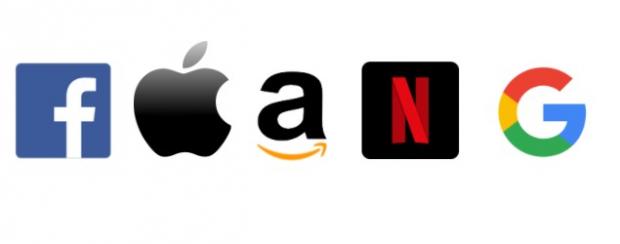Really?
The big tech companies are collectively called FAANG
What are FAANG Stocks?
FAANG is an acronym for the market’s five most popular and best-performing tech stocks, namely Facebook, Apple, Amazon, Netflix and Alphabet’s Google. FAANG was born out of the original acronym, FANG, which did not have Apple included when CNBC’s Jim Cramer coined the term.
BREAKING DOWN FAANG Stocks
Facebook (FB), Amazon (AMZN), Apple(AAPL), Netflix (NFLX), and Alphabet (GOOG) are the five technology giants trading publicly in the market today, as of 2017. Wall Street grouped these companies into one acronym to capture the collective impact that these companies have on the markets. As of Mar. 20, 2018, the market capitalization of these companies summed up to $472.38B + $760.36B + $888.66B + $136.92B +$757.54B = $3.015 trillion.
Facebook no tangible value
Apple overvalued and in real trouble
Amazon has the most value of the five, partly due to diversity of products offered
Netflix is in trouble due to Disney, CBS All Access, and other competitors coming on line in 2019
Google no tangible value
Of the five FAANG members, Netflix is in the most immediate peril.
Disneyflix Is Coming. And Netflix Should Be Scared
First, Disney has announced that it plans to acquire most of the assets of 21st Century Fox. If the Justice Department approves the $52 billion deal, Disney would gain possession of the20th Century Fox film studio, including Fox Searchlight (which has produced Best Picture Oscar winners such as Slumdog Millionaire, Birdman, 12 Years a Slave, and The Shape of Water), the X-Men franchise, the FX and National Geographic cable channels, several regional sports networks, and the television production company that makes Modern Family and The Simpsons. The resulting conglomerate would own as much as 40 percent of the U.S. movie and television industries.
Second, and more important, Disney is building a streaming product to deliver its content, old and newly acquired, directly to consumers—let’s call it Disneyflix. When it launches, in2019, it will include several exclusive series and every film in the Star Wars, Marvel Entertainment, Pixar Animation Studios, and Disney Animation universes.
I have noticed a significant drop in content that I want to watch on Netflix in the last two years and much of its original content is brooding, dark, and often not suitable for watching with my family or purchased from overseas media companies—much of which is not available with English dubbed audio. At this point I would not miss it if we cancelled the streaming portion of their service.
Folks Facebook and Google have virtually no assets. Facebook is not the destination of youth anymore and their political correctness is driving away current users or causing them to use it less. Part of the reason I opened the Facebook page for this blog is to test the limits of their AI algorithm.
Folks, the danger facing tech companies is that in most cases they are one invention away from obsolescence. Facebook is a one note pony and the next big thing can relegate them to the dung heap of history. Can you say, “My Space”?
Curiously, Microsoft—which currently has more value thanApple—is not listed. Microsoft has more value in terms of assets and revenue stream due to subscriptions and licensing agreements with enterprise customers and a diversity of other products.
Besides the armchair analysis that I offer on this blog from my man-on-the-street perspective, professional observers are noting some cracks on the FAANG consortium. Forbes is asking if we are in the midst of another tech bubble. Forbes dives deep into the technical reasons that you should be concerned.
Very few on trading desks remember the Tech crash of 2000. I remember it all too well after the partying of 1999: it was exhilarating (or painful if you were short) to watch the exponential rally in Tech and dotcom stocks in the last part of the 1990s.
Then sentiment switched from “buy everything”, to “sell everything” almost overnight. In a span of a few weeks in 2000 the Tech sector came crashing down, hard. From the peak in the NASDAQ in the middle of March 2000 to the low in December 2000 the sector lost 50% in a brutal selloff.
While it might be laughable to call for a correction of the same magnitude today, a few grey souls in the Tech industry who were around in 2000 and lost 80% of their net worth on paper have the following advice: don’t be greedy and take some gains off the table. So with an eye towards preserving capital let us look at some parallels between 2000 and today and see what rhymes and what doesn’t.
Tech Crash Echo: It’s Beginning To Feel A Bit Like 2000
Folks another thing of concern is that in the last few weeks short term interest rates (two year) have now gone higher than ten year rates. This is not normal and should cause apprehension.
Lastly, governments are considering more regulatory intervention in the tech sector due to privacy, security, and content concerns. Due to the interconnectedness of these companies, concerns are not just in the United States but the European Union and Australia just to name a few. Compliance will lead to more overhead and less profit for information centric companies. The “wild west” nature and openness of the Internet is facing challenges on many fronts.
I do believe a correction is coming and in fact is long overdue. Generally I think the stock market is overvalued but where else can you put money and get a return on it? Buckle-up. The next two years will be volatile on more fronts than the political.
